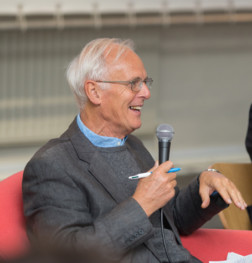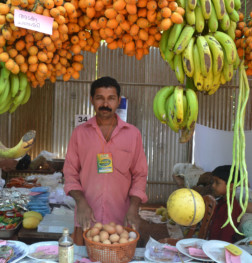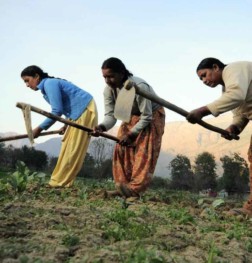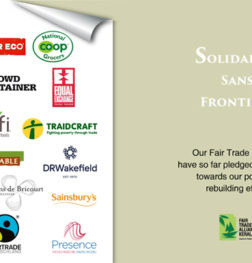
A year’s progress for the women of Pulpally in Kerala
03 February 2014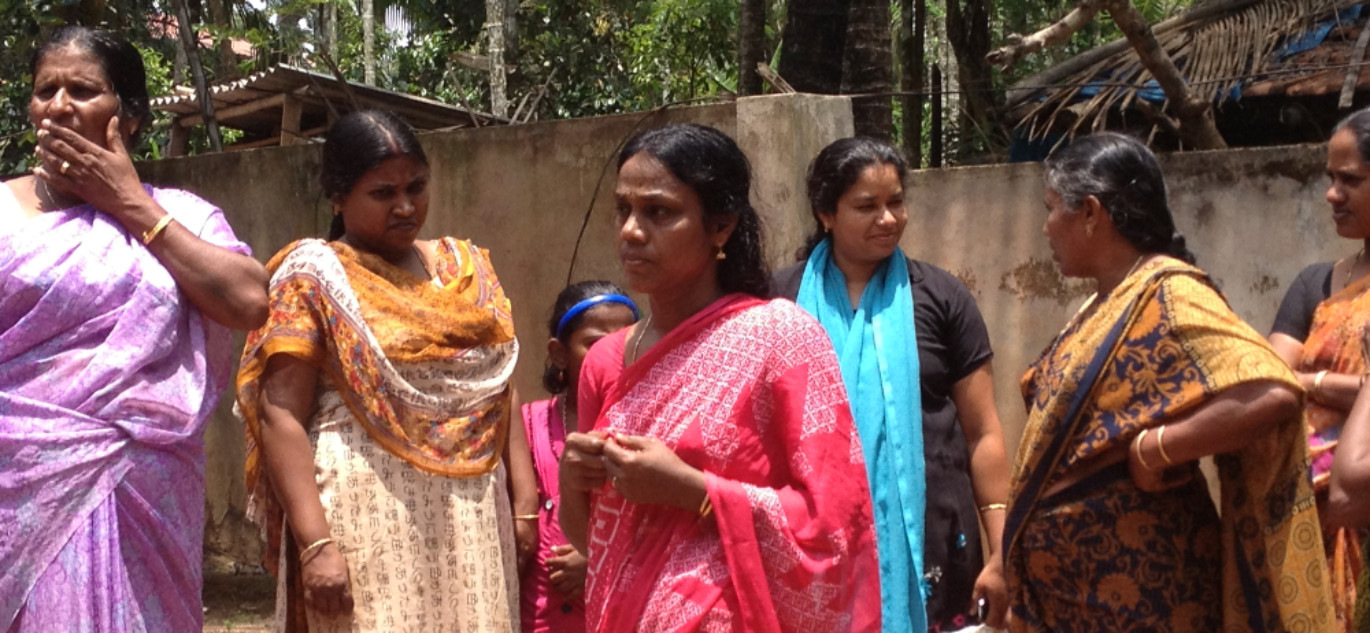
In April 2012 I visited Wayanad in Kerala and meet the Pulpally women’s group and learnt about FTAK’s ‘Fairtrade plus 3’ policy, in particular to distribute Fairtrade premiums as loans for livelihood development through women’s projects . See https://www.facebook.com/notes/equal-exchange-uk/gender-justice-at-fairtrade%20-alliance-kerala-ftak/10150672014243344 and similar for reports.
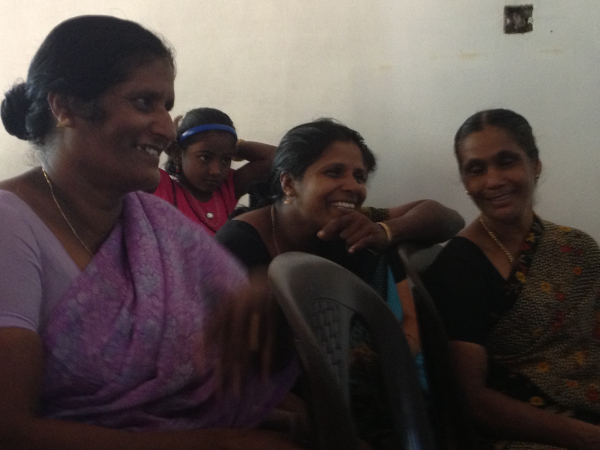
The ladies were thrilled with their success then and now I wanted to hear how their work was progressing a year later.
Our party (Tim and Martin from Fairtrade Foundation) myself, Tomy Mathew, and Paul (the FTAK district officer ) met them again . All smiles as we started the meeting. There was an air of excitement presenting to visitors again.
Philomena began by reporting on the previous meeting, describing loans repaid, decisions made and noting that they had to decide who was going to the FTAK office inauguration the next day. Apparaently there were only 6 places for the members and they all wanted to go.
The group had applied for a loan from the Fairtrade premium fund via the local panchayat board of FTAK, this had been approved at district and then centrally. This year 20 women had taken loans all now managed by the group. 10 had bought cows (Rp150,000), 5 goats and 5 for collective vegetable growing. In total Rp325000. After 8 months Rp90,000 had been repaid. All households plant tapioca root as a household staple and grow yams for mainly for sale if the price was good or storage/later use if not.
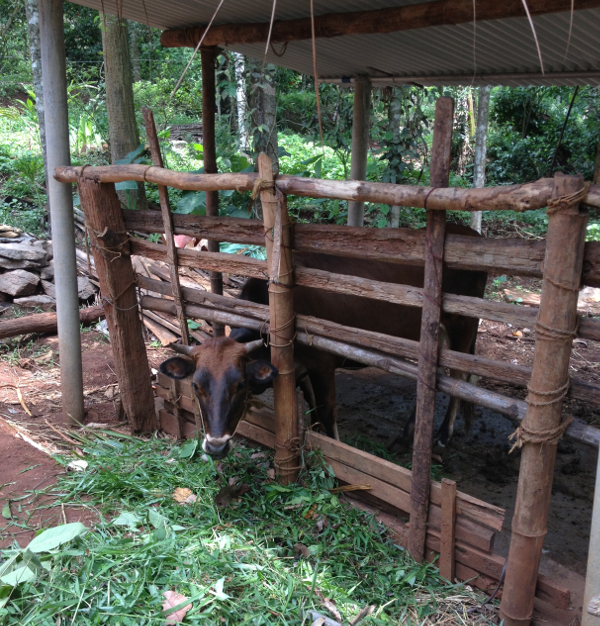
Cows were seen as a long term investment, providing cow-dung for their organic farms, milk for immediate income via the local coop and the occasional sale. Goats, as we were to learn later were ready for sale in 6 months and also a popular income generator.
What was the impact of your work this year?
‘We have only been doing this for two years so don’t expect so much quickly!. We know how to handle money though. Now we can say we have done this. ‘
‘Last year we made a profit and repaid the loan. This year we used the profit to plant again, but we didn’t give any yam money to the house (the husband). The rain was poor and we didn’t grow many (yield) and the price was bad. We will have to keep asking for money this year.’
One of the big changes reported by the district officer was attitude to travel. Their eyes had been opened and had a real appetite for travel for leaving the household chores. Molly spoke of how , following an FTAK policy statement of support for anti-nuclear action in Tamil Nadu, 5 women had been to a demonstration at Kundankulan. For years it was their menfolk who made decisions and travelled now it was their turn and the enthusiasm for new experiences was very evident.
‘We are no longer stuck in the kitchen, we meet often and always go the AGM. Don’t send us on these local trips… we want a big one with all of us’
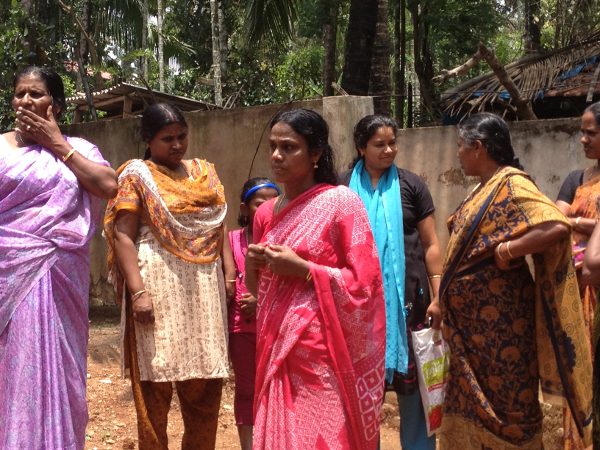
Last year, FTAK piloted cashew collection stations run by women managers. It was a success. This year the Wayanad group ran the first coffee collection depot. Theamma was the manager with Celin’s help.
Molly described how they had planned their farm work together.
‘We decided three of us would work together picking coffee on our farms for 3 days. We had to get all our jobs finished by 10 o’clock to start work. Finish the cooking and get children to school. At the end we only needed men to lift the bags’
The group had collected over 40 tonnes of coffee.
‘This year we (the group supporting the collection depot), collected nearly 25,000 kg of organic coffee and 18,000kg non organic coffee. We received 75Rp/kg for organic. Farmers received 68 with 7 later as a bonus. The group took a 0.75RP (75 piasa) commission to support our work. In total , over the season, we handled 25 lakh rupees cash (25,00,000Rp) and distributed 2 lakh bonus.’
Conversation wandered to the future. Labour shortages are hitting farms across India. Families worry about the future as children head for city lights, call centres and IT jobs.
Do you think your children will want to continue farming?
‘The older children are being trained on the farm, others will not want to farm but the land is theirs so how can they not farm it? ‘
I left wondering if this old and deeply felt connection with the land and the new-found aspirations of these women will secure a future for the Kerala homestead farmers despite the uncertainties in modern India.
